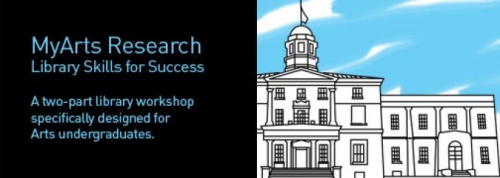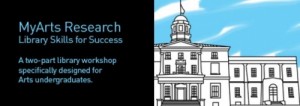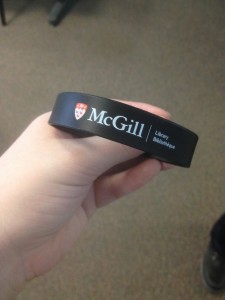Hi everyone – it’s Diana again. You may remember me from the post directly below this one, where I encouraged Arts students to attend HSSL’s MyArts Research library skills workshops.
I am a graduate student at McGill’s School of Information Studies, and I’m currently completing a practicum at the Humanities and Social Sciences Library. The practicum is an opportunity to gain professional experience using the theoretical knowledge I’ve gained in my courses, and this practicum has allowed me to develop my teaching skills through information literacy instruction.
If you’re not a librarian, “information literacy” might not be a concept you’re familiar with. The Association of College and Research Libraries, part of the American Library Association, defines information literacy as the ability to “recognize when information is needed and have the ability to locate, evaluate, and use effectively the needed information.”[1]
I’m sure anyone reading this would agree that there is an enormous amount of information out there – any basic Google search, returning millions of results in seconds, demonstrates that. Being information literate allows you to wade through it all. It’s how to know when you need a piece of information, how to find it, and how to critically evaluate and make use of what you’ve found. And a big part of every librarian’s job is helping you do that, either in one-on-one interactions or in workshops like MyArts Research.
For my practicum, I’m putting together a literature review, taking a look at how other universities teach library resources and research skills, writing these blog posts, and – best of all – teaching workshops.
In February, I attended the first set of MyArts Research workshops. At each session, I was able to observe how the librarians presented the workshop content and to offer help to students as they followed along. Then, in March, I had the opportunity to teach two 90-minute sessions of “Module 1: How to Search.”
I showed students how to navigate the library catalogue, how to narrow and shape a research topic, and how to use the Library’s core databases of academic literature. We also looked at ways to use Google effectively, explored some of the reference tools available on the McGill Library website, compared peer-reviewed and popular articles, and reviewed advanced search strategies. These are all skills an information literate student can use when doing research.
Teaching those two workshops was the highlight of my practicum experience. I had a fantastic rehearsal for the kind of work I’ll do as a librarian. I received helpful feedback, from both the students I taught and the librarians who observed my teaching. I even conquered my biggest teaching-related fear, the question I don’t know how to answer. (It happened, I got through it, turns out I did know the answer.)
The best part, though? The moment I saw the light bulb go on above a bunch of heads. That was the moment I realized students had learned something useful for their research process, from me. And that was fantastic.
[1] Association of College and Research Libraries, “Information Literacy Competency Standards for Higher Education,” http://www.ala.org/acrl/standards/
informationliteracycompetency#ildef



